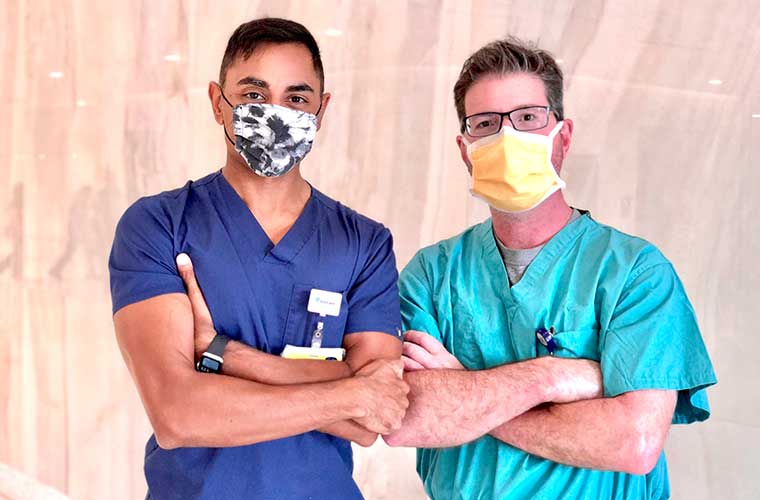St. Joseph's Hospital's Heart Institute Continues to Blaze Trails for Afib Treatment

CLEARWATER, Fla. (November 17, 2020) – Patients with atrial fibrillation (Afib) turn to the Heart Institute at St. Joseph’s Hospital knowing they will receive some of the most advanced cardiovascular care available in Florida. Likewise, physicians across the country are tuned in to the cutting-edge work underway in this innovative program.
A recent article by St. Joseph’s Hospital’s Heart Institute physicians Kevin Makati, M.D., and Andrew Sherman, M.D., along with colleagues at a Boston hospital, was published by a journal of the American Heart Association, the Journal of the American College of Cardiology, the National Library of Medicine National Center for Biotechnology Information and Cardiology Today. The article highlights the use of “CryoConvergent” hybrid ablation for the treatment of atrial fibrillation (Afib), showing once again how this team continually looks for new opportunities to provide extraordinary patient care.
St. Joseph's Hospital was the first hospital in the country to perform a cryoablation in 2011, a day after the procedure received FDA approval. Cryoablation is the process of destroying heart tissue using extreme cold. During cryoballoon ablation, a cryoballoon catheter is inserted into the heart, inflated and filled with an extremely cold substance. The extreme cold scars and damages the tissue, preventing it from sending the electrical current that causes Afib.
A year later, the hospital became the only hospital in Hillsborough County to offer Convergent. Convergent is a hybrid, minimally invasive cardiac operation that combines the expertise of electrophysiologists (heart rhythm specialists) and cardiovascular surgeons in a single procedure to treat Afib.
In 2014, the hospital opened its new Heart Institute that included a hybrid suite, making it easier to accommodate Convergent procedures. Thanks to the innovative design, Drs. Sherman and Makati have been teaching visiting physicians and hospitals at reputable programs including the Cleveland Clinic, Mayo Clinic and UCLA as examples. The physicians performed the procedure televised live in front of an international audience this past January at the AF Symposium in Washington DC.
Drs. Makati and Sherman report in the pubications, that findings show that the CryoConvergent procedure may signicantly reduce risk for recurrent Afib and Afib burden in patients with persistent Afib or long-standing persistent Afib. “We’re always looking for advancements that will help our patients feel better and get back to living their best lives,” Dr. Makati said.
AFib is the most common form of heart arrhythmia. It causes the heart to beat too fast, too slow or with an irregular rhythm, increasing the risk of stroke. The Centers for Disease Control and Prevention estimates that 12.1 million people in the United States will have AFib in 2030.
Read the article, “Safety and Efficacy of a Convergent Hybrid Procedure Using Cryo as Endocardial Energy Source for the Treatment of Persistent and Longstanding Persistent Atrial Fibrillation.”
For more information about St. Joseph’s Hospital’s Heart Institute, go to: https://baycare.org/hospitals/st-josephs-hospital/services/heart-and-vascular/heart-institute.
